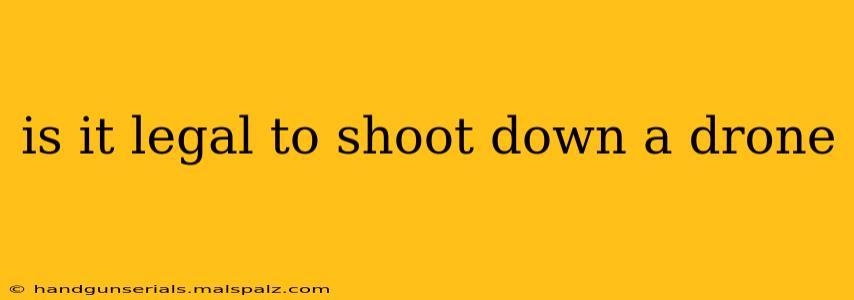The question of whether it's legal to shoot down a drone is far from simple. The answer depends heavily on several factors, including where the drone is flying, what the drone is doing, and your justification for shooting it down. There's no single, universally applicable law. This nuanced situation requires careful consideration of various legal principles and potential consequences.
Factors Determining Legality
Several key factors influence the legality of shooting down a drone:
1. Location of the Drone:
-
Private Property: On your private property, you generally have more leeway. However, even here, you must use reasonable force. Simply shooting down a drone that's merely trespassing might be considered excessive force, leading to legal repercussions. You are more likely to succeed with a legal defense if you can prove the drone posed a direct threat to safety or security.
-
Public Property: Shooting down a drone on public property is significantly more problematic. This action could violate various laws, including those related to discharging firearms, property damage, and potential endangerment of others. It's highly likely to lead to criminal charges and civil lawsuits.
2. Activity of the Drone:
-
Innocent Surveillance: If a drone is simply taking photos or videos in a public space without causing harm, shooting it down is almost certainly illegal. This action constitutes excessive force and property destruction. Remember, filming in public is generally legal unless specifically prohibited.
-
Illegal Activity: If a drone is involved in criminal activity, such as drug trafficking, espionage, or even serious invasion of privacy (such as prolonged, targeted surveillance), the legal landscape changes. However, even in these circumstances, shooting it down is a risky decision. You could potentially face charges if you act without proper authorization from law enforcement.
-
Imminent Threat: If a drone poses an immediate threat to life or property – for instance, if it's about to crash into a crowded area or a critical infrastructure site – the argument for self-defense becomes stronger. However, you must be able to convincingly demonstrate that less extreme measures were not feasible.
3. Your Justification:
-
Self-Defense: The concept of self-defense plays a crucial role. You must demonstrate a genuine and reasonable fear for your safety or the safety of others. This is a high legal bar, and the courts will scrutinize your actions carefully. Simply feeling annoyed or disturbed is not a sufficient justification.
-
Defense of Property: While defending your property is a legitimate concern, shooting down a drone is almost certainly disproportionate force. Other less violent options should be explored first.
4. State and Local Laws:
Specific state and local laws regarding drones and firearms vary considerably. Some jurisdictions might have stricter regulations on drone operation, while others might have stricter gun control laws. It is absolutely crucial to understand the specific laws in your area before taking any action.
Alternatives to Shooting Down a Drone
Before resorting to violence, consider these alternatives:
-
Contacting Law Enforcement: This is generally the best course of action. Report suspicious drone activity to the authorities, providing as much detail as possible.
-
Documenting the Incident: If possible, take photos or videos of the drone and its activity. This documentation could be crucial evidence if you later need to defend your actions or if you pursue legal action.
Conclusion: Proceed with Extreme Caution
Shooting down a drone is a serious matter with potentially severe legal consequences. Unless the drone poses an immediate and credible threat to life or critical infrastructure, attempting to destroy it is strongly discouraged. Contacting law enforcement is always the safest and most appropriate response. The legal ramifications of unauthorized drone destruction are significant, and the potential for criminal charges and civil lawsuits is substantial. Remember, ignorance of the law is not a defense. Seek legal counsel if you face such a situation.

